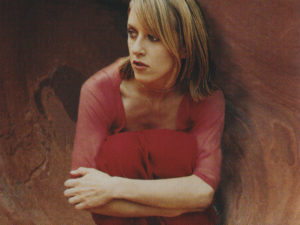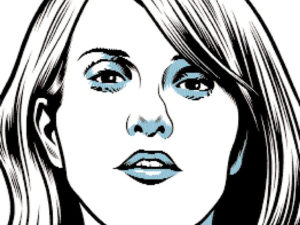The women who makes grown men cry
Alanis and Fiona take note: Five years after blazing a trail by which female songwriters could inject their sexuality into their art without shrouding it in veils of coyness, Liz Phair is moving on.
Though the former exile in guyville can still crank out libidinous bluster when the urge strikes (witness the lust-and-submission groove of “Johnny Feelgood,” from her new album, whitechocolatespaceegg), these days Phair is more likely to contemplate the joys and perils of parenthood, rather than take aim at matters below the belt. The married mother of a 2-year-old son, Phair today finds herself facing issues that are of greater consequence than dissecting a latest fling, and to her credit she’s allowed her new concerns to displace the ones that established her bad-girl reputation back in 1993.
Whitechocolatespaceegg is anything but Pollyanna-ish, however. More than a year in the making, and bearing the sonic marks of three high-profile producers (Scott Litt, Brad Wood, and Phair herself), the album nonetheless coheres brilliantly, radiating more substance than sentiment. Songs such as “Love Is Nothing” and “Go on Ahead” examine issues of marital fidelity and trust with clear-eyed realism and a grounded sense of romance. As was the case with Lou Reed’s work in the ’80s, whitechocolatespaceegg seems directed specifically at adults who can relate to both the trials and the pleasures of domestic life.
During a two-week respite sandwiched between several Lilith Fair dates and an upcoming solo tour, Phair spoke by phone with Wall of Sound about her much-anticipated return to rock and roll. Fittingly, her comments were often accompanied by the sound of her baby cooing in the background. Punctuating her comments with lots of laughter and the occasional, “Do you know I mean?,” she was unguarded and forthcoming, her demeanor marked by an easy confidence.
When you began recording whitechocolatespaceegg, you decided to have Scott Litt produce. Why was he your first choice?
Liz Phair: I had always loved R.E.M.’s albums, in particular the way they sound. And I liked [Litt’s] way of capturing a pop sensibility without being unoriginal. The things he does sound great. He makes vocals sound fantastic.
But after recording for several months with him, you decided to go back to working with Brad Wood, who had produced Exile in Guyville and Whip-Smart. What prompted that decision?
Scott and I did really well in the studio when we were sort of creating stuff ourselves, when we were being experimental without utilizing a bunch of extra musicians. But when we tried to record the bigger rock-song sounding stuff, it just didn’t work that well. We both got very frustrated, and we didn’t know what to do. Finally it was suggested that I work on my own for a little bit, to kind of flesh out the songs arrangement-wise. I did that, and then when it came to recording again, everyone wanted me to try to work with Brad. It so happened I had reacquainted myself with my earlier work, and had reappreciated all that he’d done. I saw its merit, and what his genius is.
Which is what?
Which is to take small songs that I create and help realize them and give them a lot of instrumentation without losing that core “Liz Phair” sound. As it turns out, that’s much harder to do than I originally thought.
You continued to write during the time you were pregnant with your son. How did being pregnant affect your songs?
It made them a little trippier. Sometimes when I write songs, I’m really conscious of it, and I focus hard on certain things and really try to work at it. But when I was pregnant, I wasn’t paying that much attention to writing songs. I just did it in relation to my emotional ups and downs. My favorite way to write songs is when they come out of you from some subconscious place, kind of like a dream does — where they have that powerful, already-written quality. And a lot of that happened while I was pregnant — there was a lot of stuff, emotionally, that I hadn’t thought about that suddenly appeared.
Did that continue to happen after the baby was born?
For about eight months or so. Then it all kind of synthesized. The thing about this album that really strikes me is that it combines the person I am now with the person I was throughout my whole life, rather than just being indicative of a two-year or a three-year period. It really felt the way Exile [in Guyville] did, in that it encompassed my whole lifetime. It’s similar to Exile in a lot of ways, in terms of how I recorded it, and in the way I drew from my past and my present.
Four years passed between your last album and whitechocolatespaceegg, and even after you began recording there were a lot of delays. Did your record company put much pressure on you to come up with something during those years?
They were pretty cool. They were all waiting to see if I would resurface at all. No one really knew what to expect, after I had the baby, but I’m thrilled to say that they were very supportive. I felt like it wasn’t until the end [of recording], when they could tell I had a substantial body of work, that people started to get frantic. Then it was like, “Try this,” or “Do this,” or “We need more of that.” It got exciting for them. At the time I was really kind of frustrated because I kept trying to convey things to them and they would be like, “I don’t see it, I don’t get it.” And I’d go back to the drawing board and record more stuff. In retrospect, I realize they were doing that because they were getting excited because now they had something they could work with.
You say that at some point while you were working on this album, you went back and listened to your previous work. Did you feel any urge to revise your old material?
[Laughing] I sometimes have the urge to go back and revise statements I’ve made in the press. But no, I didn’t have that kind of urge at all, really. I don’t look back very often, and that’s a fault, because it would behoove me to re-examine my previous work. What it did was really shock me, because I realized just how much that was special in my earlier albums was owed to Brad. I had always assumed I had all these great ideas — and I did — but a lot of it was him, in terms of how things sounded, and the way he mic’d the instruments, or the way he mixed it. And I was just flabbergasted at how much of his talent had maybe been taken for granted. He has a way of taking my personal slant and allowing that to live and breathe all the way to the finished product. As it turns out, that’s something that isn’t very common with a producer and a songwriter. I had to go and explore and work with other people in order to learn that.
Despite being recorded with two producers — or rather three, including yourself — the album coheres really well. To what do you attribute that?
A lot of that has to do with Tom Lord-Alge, who mixed the whole thing. I mean, you could say a lot of that has to do with my feisty ways, too, since I picked songs where I really felt myself to be present, personality-wise. But I think a lot of the credit goes to the way Tom mixed it. I learned a lot [from him]. This four years between albums wasn’t just about, “Oh, can we squeeze something else out of Liz Phair while she’s busy having a baby.” It was about me wanting to grow, and wanting to get a sense of what other bands get at the beginning of their careers, just by virtue of having already been working at it for so long. I got famous much sooner than I should have. I was totally inexperienced, I didn’t know anything about the business, and everything happened just like that. So this time — between Whip-Smart and whitechocolatespaceegg — was my time to actually learn what it’s like to do all these different things, to try different things and to appreciate all that you have to do.
Which come easier for you, ballads or rockers?
They’re pretty much equal. A lot of it has to do with the environment that I’m in. I’m pretty reactionary, so if I’m sitting around being pregnant, or, after the baby’s been born, if he’s sleeping, I’ll find myself writing quiet songs, or kind of wistful songs. And if I get a couple of days to myself — where everybody’s out of town, and I can turn the volume up on my amp and mess around with the knobs and dials — suddenly all I want to write are punk songs. It really has to do with the situation I’m in, in terms of making it loud or keeping it soft.
How much of your writing is autobiographical, and how much relies on empathy, or putting yourself into the soul of an imagined person?
Which album are you talking about?
Let’s stick with the new one.
Probably three-fourths autobiographical, and one-fourth imagined.
Does that ever frighten your husband?
[Laughing] It ought to, but it doesn’t. I’m really lucky that he doesn’t listen much to lyrics, and when he does, he doesn’t pay attention to them. Or rather, he does pay attention, but he’s a mellow guy. I think he understands what a lot of people don’t; namely, that this is a creative expression. He understands that there’s a lot of imagination going on, although a lot of it might be drawn from our life.
Do you think what made Exile especially shocking five years ago was the fact that you couched these lyrics in such pretty melodies?
The whole concept behind my earliest work — the “Girly Sound” tapes, before I had a record deal — was really conceptually subversive. It was to mask adult female sexuality in a little-girl package. “Chopsticks” [from Whip-Smart], for instance, is like that. “Chopsticks” is the basis for a really dirty song about real life and adult sexuality. I used to speed up the vocals so they would sound even more childish.
So that concept was entirely deliberate on your part? You knew what you were doing?
Oh, yes. Conceptually, I knew what I was doing, but in terms of the impact, I didn’t have a clue.
If Exile In Guyville came out today, how different do you think the reaction to it would be?
(Laughs) People would probably accuse me of riding on the coattails of Alanis Morissette. They would be like, “Oh, you’re just trying to use shock value to jump on the ‘female sexuality’ bandwagon.” But I think those are still great songs. I’m sure they would appeal to people, although I don’t think they would have the same impact. It would be seen as me trying to ride a wave.
By Russell Hall
Wall Of Sound, September 1998







